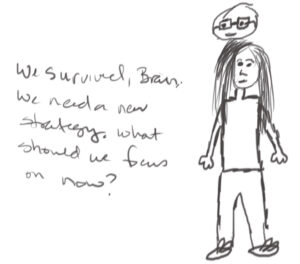Understanding Resiliency
I have always been fascinated by this idea of resiliency. I started writing about brain resilience in my post, Childhood Abuse Survivor: I am Lucky. In that post, I wrote about how I now realize that I was actually teaching my brain to be resilient when I was fighting against the abuse.
 The way I understand resilience, no one is born with it, everything that we do, resilience included, is learned. It is the partnership between you and your brain. The way to become more resilient is consciously changing your behaviors and thoughts. Your brain processes a lot on the unconscious level and controls quite a bit of what you do and how you react.
The way I understand resilience, no one is born with it, everything that we do, resilience included, is learned. It is the partnership between you and your brain. The way to become more resilient is consciously changing your behaviors and thoughts. Your brain processes a lot on the unconscious level and controls quite a bit of what you do and how you react.
Once you become aware of your unconscious thought patterns, you can begin to modify those. Over time you can use your conscious thought to adjust your unconscious thoughts so that you don’t have to think about how to react or what to do.
A perfect example of this is when I made the decision that I like myself better without alcohol. I still have to be very aware of how I am feeling and what I think when alcohol is around. Eventually, I won’t have to do that anymore, once the old messaging (drink more, its super fun) is replaced with the new messaging (you are more fun being you without alcohol).
Unconscious Control
I first came across this idea while reading Naked Mind Control Alcohol.1 The book and the website are specific to alcohol and delving into what we unconsciously believe about alcohol and its effects on us. It is this unconscious belief system that reinforces our drinking behavior and makes it very hard to decrease or stop drinking altogether.
The author of Naked Mind1, Annie Grace, explains and invites you to explore the idea of liminal thinking.2 Liminal thinking helps to uncover our unconscious beliefs about pretty much everything. Annie Grace focuses on alcohol in her book.
When you reveal those unconscious beliefs, you can see if they are actually true. This liminal thinking process can be used for anything, alcohol, running a marathon, etc. Our beliefs about things, whether that is alcohol, or ourselves, can hinder or help us. Why not use that power to help yourself?
I didn’t connect resiliency and liminal thinking until today as I sat down to work on this post. The way I see it, resiliency is when faced with a situation that you need a shorter-term strategy, and liminal thinking is when you need a longer plan. They both accomplish the same thing, and in similar ways, changing the way we unconsciously think.
Find the Quiet
 If you are struggling to hear that voice, try to find a quiet spot. Go for a walk around the block or at the park if you are near one. I used to stare at myself in the mirror. I couldn’t really get away much because well, it was hard to leave the house without twenty questions from someone.
If you are struggling to hear that voice, try to find a quiet spot. Go for a walk around the block or at the park if you are near one. I used to stare at myself in the mirror. I couldn’t really get away much because well, it was hard to leave the house without twenty questions from someone.
Having a focal point helped me to block out all of the other stuff going on around me. Something about staring at myself, looking into my own eyes, it helped me to really think. I thought about the person that I wanted to be, where I wanted to be (not there), and how I could become the person that was trapped inside.
Focusing on ourselves is hard to do. Especially as women. We are not taught to be selfish. We are taught to take care of everyone else and that our own needs are not as important. So, I know it is hard to do. It may take some time to be able to do this. Don’t give up. I know you can do it.
Do you hear all of those voices, the worry, the wonder about the future, the planning? A lot is going on in there, so don’t freak out. Now, move past all of that. There is a place in your mind that is quiet. Find that place and stay awhile.
The Voice Inside
The hardest part of changing our unconscious thought process is knowing what it is in the first place. You know that voice in your head? The one that most of us ignore consciously and then the next moment we are doing the thing that voice told us to do?
Yup that is your unconscious. It tells you what to do. Well, that voice comes from somewhere. The experiences you had growing up, watching the adults in your life, all of those unisonous voices learned what to tell you to do from others and you also. In a way, it is you telling yourself what to do through your unconscious mind.
Mm…actually I am now wondering if the hardest part is quieting the world around us to be able to hear that voice. When I was drinking a lot, I couldn’t hear that voice. I kind of could, but not really. We have so many distractions in our world, phones, other people, jobs, etc., that we never really sit.
Since the beginning of the pandemic, I have noticed more people taking the time. Hopefully, they are listening to that voice. It can change your life. Whether or not you agree with that voice, being aware of what it is saying will alter your outlook.
Reprograming Resilience
 As compared to how I grew up I am in a safe environment surrounded by people who love and care about me. The resilience that I developed before I don’t need it. And yet, I still push all of my emotions down and away from me.
As compared to how I grew up I am in a safe environment surrounded by people who love and care about me. The resilience that I developed before I don’t need it. And yet, I still push all of my emotions down and away from me.
I think in a lot of ways, I still don’t believe that I am safe. I have to keep that emotional distancing resilience tactic right at the surface where I can easily use it. Even though I know it isn’t healthy, and I don’t need it, but there is that voice (right?) that tells me that it might change.
Well, that is just great. I realized that I am putting myself on pins and needles, waiting for that “inevitable” fall into the unsafe shitshow again. I am taking this as progress. And this is why my therapist and I decided that writing is my way of digging deep.
Finding the Right Message
Okay, so it is the message that I am not safe that I need to look at first. I need to address the first one, and then I can change the second one.
Or can I change them both? Not sure yet, but the reprogramming is very similar to the programming of the thoughts. It is taking those thoughts that aren’t “logical” like that I am not in a safe place, and that no place is safe.
I have to dig deeper, though. What does safety mean to me? Continuing to ask questions like that will help you get to the answer that you need.
Once I have that figured out, I can create the mantra. It should be short, like “I am safe,” or when I was a kid, it was “It is not me” so that it easily remembered and repeated. It is possible that having longer mantras works too. I was a kid when I taught myself how to protect myself mentally and emotionally. Maybe as an adult, it can be longer than that.
Resilience: Make or Break
I also remembered using that when I would look in the mirror during that focus time that I mentioned earlier. I used it to begin to list the things that were good about me so that I could also counteract all of the negative things that were said to me. Those things took hold in my brain and have stayed with me my whole life. I was still numbing myself with alcohol, and I didn’t realize until recently that those old messages were still playing in the background.
And now that I am aware of them too, I will begin changing those also. One step at a time, or one resiliency update at a time. I am notorious for taking on too much. I have to remind myself that focusing on one thing is okay.
Whoever penned the rhyme, “sticks and stones may break my bones, but words will never break me”3 must-have never experienced an emotionally abusive home. If they did, they would have never said that.
For good or bad, words have the power to make or break us. I used to think that they would only break me. But when I started using words and creating a resilient brain, I knew that words can be a power for good.
Sources Cited
- Grace, Annie, The Unconscious Mind and Alcohol Addiction: Part 1: Liminal Thinking, https://thisnakedmind.com/the-unconscious-mind-and-alcohol-addiction/, accessed July 30, 2020
- Gray, D. [Dave Gray]. (2015, January 23), Liminal Thinking The Pyramid of Belief, accessed July 30, 2020
- Wikipedia, https://en.wikipedia.org/wiki/Sticks_and_Stones#:~:text=It%20is%20reported%20to%20have,words%20will%20never%20break%20me. Accessed July 30, 2020


0 Comments